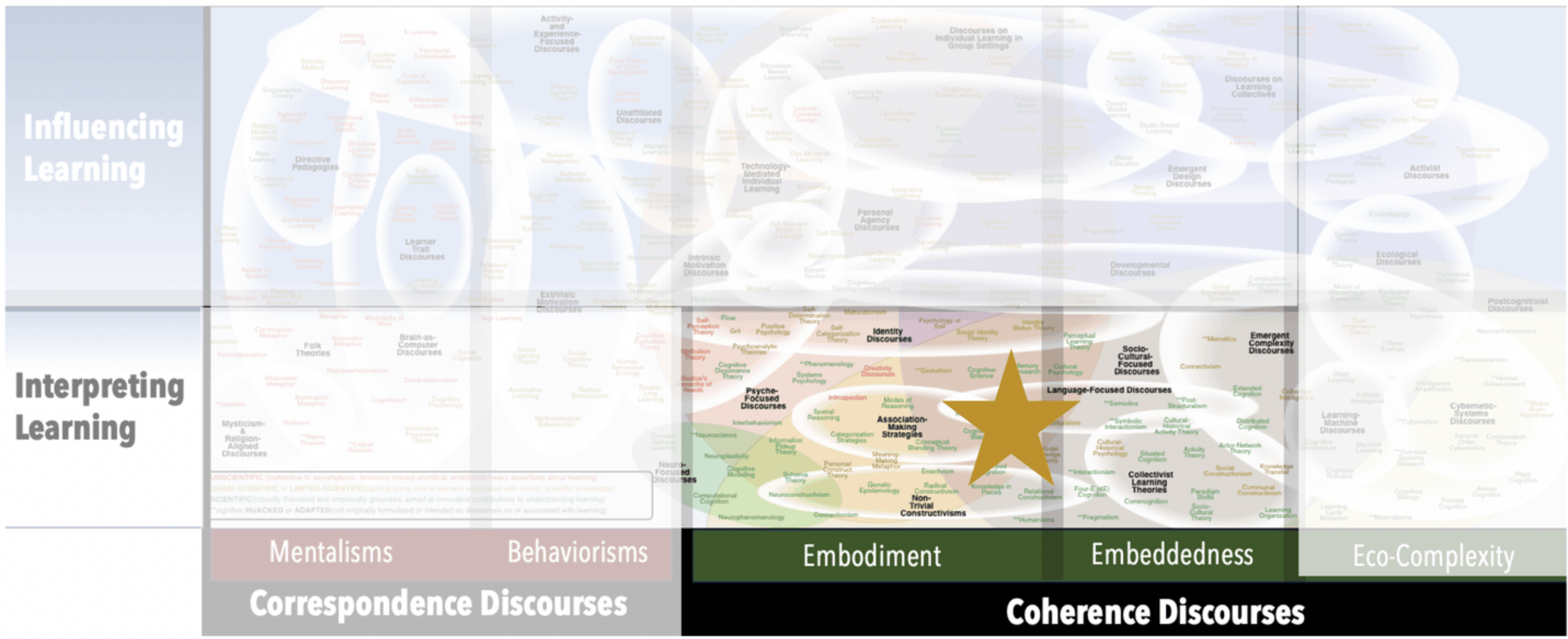Focus
Tendency/capacity to project one’s senses of action and agency onto objectsPrincipal Metaphors
- Knowledge is ... harmonious situated action
- Knowing is ... being in tune (with an other/object)
- Learner is ... an embodied agent (able to couple with an other/object)
- Learning is ... attuning/transferring (to/with an other/object)
- Teaching is ... creating/designing (contexts that foster transference)
Originated
1980sSynopsis
Contrasted with dissociated or alienated learning, Syntonic Learning is about engaging one’s body and senses, aiming to develop a level of self-knowledge that enables one to transpose one’s own movement in space onto an object’s movement or into a program for movement. The idea of Syntonic Learning was first used by Seymour Papert when, while observing children’s use to Logo to program a Turtle to trace out a circle, he noted their tendencies to perceive and characterize the Turtle’s movements in terms of their own actions and intentions. Related constructs include:- Syntonic – being in tune with (someone else) or in harmony with (one’s situation). The word is borrowed from physics, where it means “having the same frequency,” and it is derived from Greek sýn- + teíneien “stretched together.”
- Syntonicity – an extension of the metaphor of “in harmony with” that refers to the use of icons as visual metaphors to simplify complicated technical actions for users (e.g., enabling one to organize “files” into “folders” by “dragging and dropping”
- Egodystonic (Sigmund Freud, 1910s) – meaning “ego not in harmony,” a descriptor applied to dreams, urges, and other manifestations of one’s desires that conflict with one’s ideal self-image
- Egosyntonic (Sigmund Freud, 1910s) – a descriptor applied to actions, values, emotions, and other qualities of one’s enacted personality that are fitted to one’s ideal self-image
Commentary
The notion of “syntonic” has to do with being in harmony, and it has come to have multiple meanings in reference to human action. For instance, Sigmund Freud used the phrase “ego syntonic” to refer to the level of synchrony between one’s instincts and one’s needs and goals, and the phrase has since been applied more broadly to coherence across one’s intentions, goals, desires, likes, and dislikes. Other uses include “cultural syntonic” (referring to connections between abstract ideas and cultural activities) and “body syntonic” (referring to the sense of the relationship between one’s body and an object). Only the last of these is relevant to Syntonic Learning.Authors and/or Prominent Influences
Seymour PapertStatus as a Theory of Learning
Syntonic Learning is a discourse on learning. With it focus on the capacity to project one’s senses of action and agency onto an object or form under one’s control, Syntonic Learning fits simultaneously among Embodiment Discourses and an Embeddedness Discourses.Status as a Theory of Teaching
Syntonic Learning is not a theory of teaching.Status as a Scientific Theory
While there is considerable literature on Syntonic Learning, it is mainly theoretical in nature. Syntonic Learning can be construed as robustly theorized but with limited empirical support.Subdiscourses:
- Egodystonic
- Egosyntonic
- Syntonic
- Syntonicity
Map Location

Please cite this article as:
Davis, B., & Francis, K. (2022). “Syntonic Learning” in Discourses on Learning in Education. https://learningdiscourses.com.
⇦ Back to Map
⇦ Back to List
